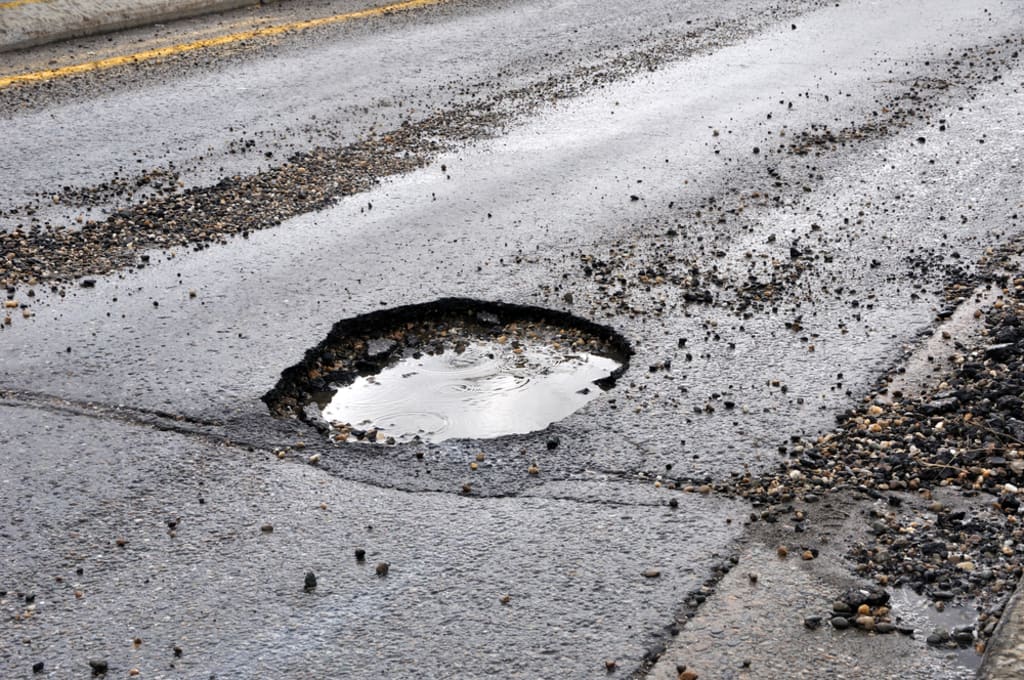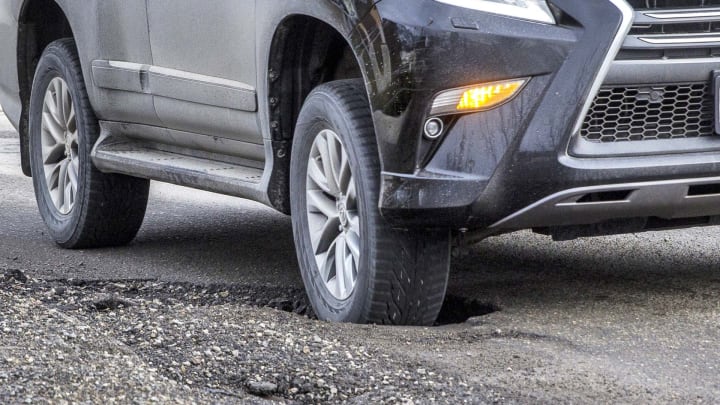Driving in Pothole Season
Potholes: What They Are, What They Do, and What You Can Do About It

Some call him a prankster, others say it was a social experiment. Either way, Coby Persin and I have different means of dealing with springtime potholes. Where I swerve across medians and slide precariously near the edge of ditches, Coby plants vegetation on the potholed streets of New York City. The city has told him to stop. In contrast, experts everywhere seem to agree with me – if one can, one should avoid hitting the things.
Potholes occur as a result of the combined effects of wear and tear and environmental erosion due to seasonal freeze thaw cycles. Essentially, potholes are structural failures in a man-made surface. Similar in effect to ice freezing, potholes are a product of expansion and contraction of water under pavement. The holes begin as spider cracks in the road and develop into holes of varying sizes when water weakens the soils beneath the pavement and driving vehicles add stress to the cracked road surface.
Depending on the size of the pothole and the speed of travel, driving over a pothole can seriously harm a vehicle. This can make spring-time driving dangerous, particularly if yours is a low-riding vehicle.
Pothole Driving Season

When possible, avoid driving into potholes.
Potholes generally damage vehicles in several primary areas. Tires can sustain punctures, resulting in flats, or bulges. Rims can bend or chip if driven over a pothole. Suspension and alignment can be affected when a vehicle connects soundly with a pothole, and undercarriage and/or body damage may also occur.
A tire bulge looks like it sounds – like a bubble in the tire. Bulges can affect the manner in which your vehicle drives, and these tires need to be replaced immediately. Low-profile tires are the most susceptible to pothole damage. Other than avoiding potholes altogether, ensuring that tires are properly inflated is the best defense for any vehicle.
Although bent wheels may be repairable, chipped wheels may fail completely and catastrophically. This type of damage to the rims can compromise the handling of your vehicle, so chipped wheels need to be replaced immediately.
Although the suspension in your car is designed to absorb impacts, the sudden jarring of a pothole can be enough to damage the car with misalignment, broken ball joints, or damaged shocks or struts. If you hit a pothole and then hear unusual noises from your vehicle, if the handling feels loose or pulls to one side, or if it handles poorly when taking a corner, take your car to a shop. These problems require the repair skills of a qualified mechanic.
When potholes damage the undercarriage or body of a vehicle, exhaust pipes, mufflers and catalytic converters are all at risk, particularly in vehicles which are low to the ground. Bumpers and side skirts can also sustain scrapes from potholes, and this damage can be both cosmetic and dangerous.
Annual word-wide repair claims for pothole damage to vehicles occur in the millions of dollars, but this is also where there is some good news. Since roads are regulated by governmental bodies and since potholes are essentially considered construction flaws, it may be possible to put a claim in for damages with your local city government. If that is your intention, be sure to include photos, diagrams, receipt of damages, witness statements and contact information, and make your claim as thorough and as detailed as possible.
When you make a claim to the city, you are basically suing the city for damages, and the first thing you will have to do is prove that the damage occurred because you hit a pothole. Be prepared to wait, as the city's insurance adjuster will have to review the claim and decide the city's responsibility. This process can take several months. The city must be found grossly negligent, meaning they had knowledge of the hole for over a month without repairing the road, before a claim will be settled in your favor.
Another potential solution to vehicle damage caused by a pothole is an insurance claim, since auto insurance views pothole damage as a collision. As long as you have collision insurance, you will likely only have to pay the deductible. The remainder of your repair should be covered.
You can prepare for pothole season by topping up the air in your tires, and by slowing down and driving with extra care. Be aware that puddles may cover hidden potholes. If you do hit a pothole, it is best to drive over it without swerving or slamming on the brakes. Swerving may cause other avoidable damage, and you may find your brakes lock and actually intensify the impact of the pothole.
From my personal driving experience this year, it seems that there are more potholes and that they are deeper than other years. I live on the boundary line of a smaller and a larger town, and I can tell the moment I have entered the larger zone, as the road maintenance immediately improves. Experts, however, disagree with my opinion about the increased abundance of potholes. Instead, some suggest that there is a difference in our modern cars. Compact vehicles and smaller wheels mean that when you hit a pothole today, your body will feel the bump. Either way, the advent of pothole season does have one silver lining: potholes in the road mean spring is here. Soon enough I will be rolling down my car windows. Summer driving season is almost here.
About the Creator
Leigh Macfarlane
With a Creative Writing MFA, Leigh loves writing, photography, music, family, animals, stargazing, swimming, coffee, chocolate. She raised 4 children, bravely works in a daycare and hates car problems. Mosquitoes and Lily the dog love her






Comments
There are no comments for this story
Be the first to respond and start the conversation.